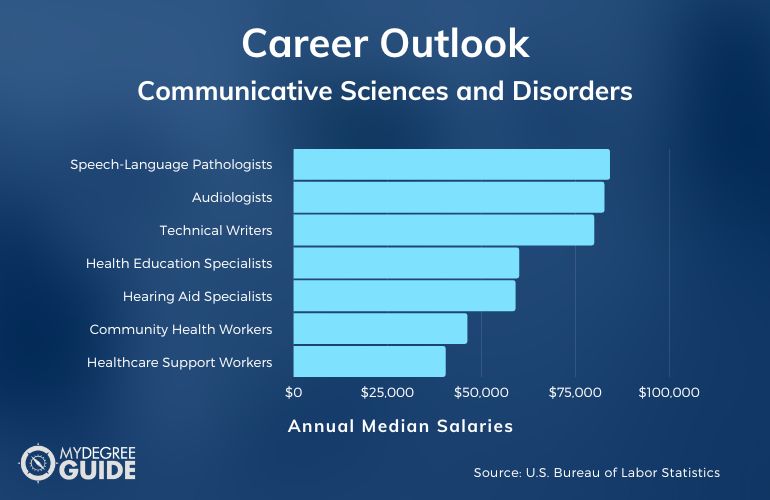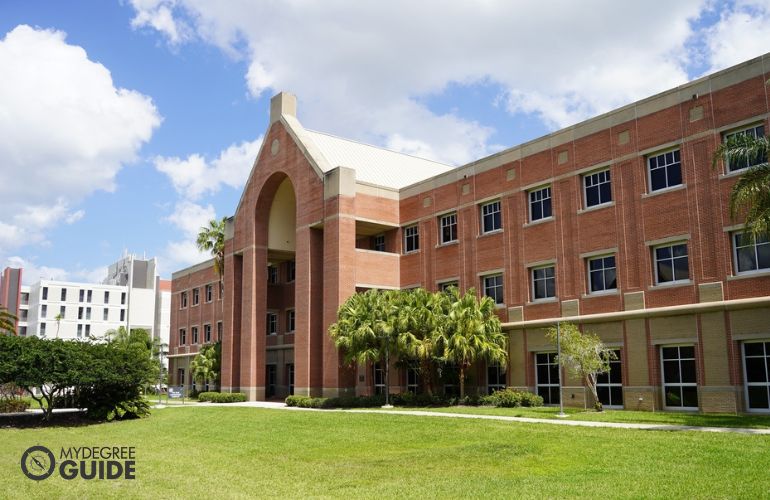If you want to understand the complex field of human communication and build a foundation in this area, you might consider a communication sciences and disorders degree.

Students in this program study communication processes, including language development, audiology, and speech sound development. Communication sciences and disorders majors also focus on the science of communication, including biology, linguistics, and psychology.
Editorial Listing ShortCode:
Careers in the fields of audiology and speech-language therapy are in high demand, with rapid growth projected to continue.
Universities Offering Online Bachelors in Communication Sciences and Disorders Degree Programs
Methodology: The following school list is in alphabetical order. To be included, a college or university must be regionally accredited and offer bachelor’s in communication sciences and disorders degree programs online or in a hybrid format.
Maryville University
Maryville University offers a Bachelor of Science in Communication Sciences and Disorders. The program offers opportunities to complete clinical observation studies and to prepare for graduate study in speech-language pathology. There are three start dates offered every year. Test scores are not required to apply.
Maryville University is accredited by the Higher Learning Commission.
Northern Arizona University
Northern Arizona University’s Bachelor of Science in Communication Sciences and Disorders features classes both on campus and online. The curriculum is designed to prepare students for Speech-Language Pathology Assistant (SPLA) certification and speech-language pathologist graduate study. It emphasizes practical skills and scientific thought.
Northern Arizona University is accredited by the Higher Learning Commission.
St. Petersburg College
St. Petersburg College offers a Bachelor of Health Sciences in Communication Sciences and Disorders through a partnership with the University of Florida. The program is designed for those preparing to study speech-language pathology, audiology, or related fields at the graduate level. The degree is available online.
St. Petersburg College is accredited by the Southern Association of Colleges and Schools Commission on Colleges.
University of Florida
The University of Florida offers a BHS in Communication Sciences and Disorders online. This full-time program features courses taught by the same professors who teach on campus. The curriculum examines the processes associated with human speech, hearing, and communication and the treatment of disorders.
The University of Florida is accredited by the Southern Association of Colleges and Schools Commission on Colleges.
University of Montana
The University of Montana offers a fully online Bachelor of Arts in Communicative Sciences and Disorders. By stacking a few additional courses onto the program, an SLPA certificate may be earned along with the degree. Courses are 8 weeks long and have no set meeting times.
The University of Montana is accredited by the Northwest Commission on Colleges and Universities.
Online Communication Sciences and Disorders Degrees

A major in communicative sciences and disorders (CSD) is designed for students to gain a foundation in human communication and help people with communication disorders.
Communication sciences and disorders colleges provide students with a foundation in speech, language, linguistics, language and hearing development, disorders, and rehabilitation. While the curriculum will vary by program, listed below are some common topics covered in a communication sciences and disorders major:
- Language development
- Audiology
- Speech science
- Language disorders
- Hearing disorders
- Language science
- Hearing science
- Developmental psychology
You can also study the cultural, linguistic, and social aspects of communication disorders and differences across various cultures.
Many programs use a combination of classroom study, in-person and virtual observations, and clinical activities to provide students with an in-depth knowledge of this intricate field of study. A major in communication sciences and disorders will also explore assessment and diagnostic strategies for hearing loss and options for rehabilitation and treatment.
Career opportunities exist in many sectors and industries, including government agencies, nonprofit organizations, educational institutions, and medical facilities.
Graduates with a bachelors in this field have pursued careers as:
- Teachers or teacher assistants
- Research assistants
- Medical assistants
- Vocal coaches
- ASL interpreters
- Audiology assistants
- Speech language pathology assistants
Some of the above careers may require additional certification. This degree path can also help you develop versatile communications skills that are applicable in a range of fields, including media, sales, public relations, and health and human services.
In addition, a CSD degree is a common foundation for graduate studies in audiology or speech-language pathology. While a masters is required for speech-language pathologists, a doctorate is the minimum education requirement for audiologists.
Communicative Sciences and Disorders Careers & Salaries

Students with a major in communication sciences and disorders may find a wide variety of career options after graduation.
Many go on to pursue graduate degrees in the field. A masters is required for speech-language pathologists, and audiologists are required to hold a Doctor of Audiology (AuD).
Students can also pursue numerous career opportunities with a bachelor’s degree. Graduates can find opportunities in schools, daycare facilities, nursing homes, medical facilities, nonprofit organizations, and private practices. This degree can also help you qualify for a range of communications careers.
According to the Bureau of Labor Statistics, below are the median salaries of careers related to the study of communication sciences and disorders.
| Careers | Annual Median Salaries |
| Speech-Language Pathologists | $84,140 |
| Audiologists | $82,680 |
| Technical Writers | $79,960 |
| Health Education Specialists | $59,990 |
| Hearing Aid Specialists | $59,020 |
| Community Health Workers | $46,190 |
| Healthcare Support Workers, All Other (Including SLP Assistants) | $40,420 |
| Social and Human Service Assistants | $38,520 |
| Occupational Therapy Aides | $37,060 |
| Teacher Assistants | $30,920 |
Individuals interested in teaching may find employment as teaching assistants, vocal coaches, tutors, health education specialists, and daycare workers.
Graduates may also seek opportunities as audiology assistants, occupational therapy assistants, and speech-language pathology assistants. Some of these roles may require obtaining certification. Other opportunities include American Sign Language (ASL) interpreter, rehabilitation aide, language consultant, and hearing aid dispenser.
Individuals who excel at and enjoy writing may also find careers as technical writers, covering research, medical, and technical topics related to speech pathology and audiology.
Communication Science Disorders Bachelor’s Curriculum

While specific courses will vary by program, some of the courses you may take with a speech therapy major are listed below:
- Introduction to Speech-Language Pathology: This course introduces you to speech-language pathology and audiology principles.
- Language Development: Students in this course will study written and spoken language development across the lifespan, from infancy to adulthood.
- Audiology: This course focuses on the science and physics of sound, including the anatomy of hearing, hearing loss and aids, and hearing assessments.
- Developmental Psychology: Students will study how psychological, genetic, social, and maturational factors affect behavior at all stages of development and life.
- Neural Bases of Communication: This course focuses on the neurological processes related to speech and language, including disorders due to neurological dysfunction.
- Speech Science: Students will study and analyze the physics of speech, including the physiological, physical, and perceptual aspects of speech production.
- Articulation and Phonological Disorders: This course includes assessing and diagnosing articulation and phonological disorders and basic intervention strategies.
- Behavioral Methods in Communication Disorders: Students will study social, behavioral, and emotional challenges for individuals with communication disorders.
- Hearing Rehabilitation: This course includes the study of speech habilitation, acoustic amplification, educational considerations, and social adjustments for the hearing impaired.
- Basic Phonetics: Students will study articulatory and acoustic phonetics, including transcription of standard speech patterns and regional dialects.
In addition to the types of speech pathology major courses listed, most bachelor programs will require the completion of general education courses, including English, science, and math.
CSD Major Admissions Requirements

While admissions requirements vary by school, some common requirements for earning your CSD degree are listed below:
- Minimum GPA. Some schools require your high school GPA to be above a certain minimum requirement, which can also vary by program.
- Official transcripts. Most programs require copies of your official transcripts from high school and any college-level courses.
- SAT or ACT scores (if required). Some programs require copies of your SAT or ACT scores, but a growing number of programs no longer request standardized test scores.
Much like applying for an online bachelor’s in psychology, you may need to complete an online application and pay an application fee for both types of programs.
Accreditation

As you explore your options for communication sciences and disorders programs, it’s beneficial to consider the accreditation status of prospective schools.
The accreditation process verifies that a school’s programs, faculty, and student services meet agreed-upon educational standards. Schools recognized with regional accreditation are the most widely accepted by other schools and employers. Earning an accredited bachelors degree is especially important if you plan to pursue any additional degrees.
You can visit the US Department of Education’s website to learn more about postsecondary accreditation.
Financial Aid and Scholarships

As you look into earning your CSD degree, you can also see what financial aid and scholarship opportunities are available to help fund your degree. You may find scholarship opportunities directly through schools or through various public and private organizations.
You can also explore financial assistance options through the government, including student loans, grants, and work-study opportunities. While loans typically need to be repaid, grants do not. Some federal aid options, such as Pell Grants, are designated specifically for undergraduate students.
You can visit the Federal Student Aid website to learn more about the financial aid options that may be available to you.
What Is a Communication Disorders Degree?

A communication disorders degree is a program that provides students with a foundation in human communication. Courses in a CSD degree include studying language development and disorders, phonetics, rehabilitation strategies, and intervention for speech and language disorders in schools.
In addition to understanding the physics of sound and communication, students will study language science, psychology, neurology, and linguistics, among other topics. With the foundation provided with this degree, graduates can directly pursue employment in fields like healthcare, education, and communication. A CSD is also a common foundation for graduate studies in audiology and speech-language pathology, others pursue a masters in communication disorders online.
What Can You Do with a Bachelor’s Degree in Communication Sciences and Disorders?

After graduation, students with a communication sciences and disorders major find employment opportunities in numerous industries.
The most common industries for graduates include education, health, human services, public relations, government, and media and communications. Many graduates find opportunities as assistants for audiologists or speech-language pathologists. These roles may require special certification. Other opportunities include teachers, tutors, vocal coaches, daycare center directors, and language consultants.
A CSD degree is also a common foundation for graduate studies in speech pathology and audiology. Those interested in becoming audiologists, speech language pathologists, or postsecondary teachers pursue advanced degrees.
How Long Does It Take to Get a Communication Sciences and Disorders Online Degree?

The time needed to complete a major in communicative sciences and disorders will vary based on several factors, including your enrollment status and schedule.
For students enrolled full-time and following a traditional 16 week semester, a bachelor’s degree can generally be completed in 4 years. Students following an 8 week semester who are enrolled year-round, including during the summer, may finish in less time. If you are enrolled part-time, completing your degree program will likely take longer.
Is a Communication Disorders Major Worth It?

Yes, a communication disorders major is worth it for many students. In this type of program, you can develop versatile skills—including critical thinking, problem-solving, and written and oral communication skills—that are applicable to many careers.
Graduates often find opportunities in various industries, including education, healthcare, public relations, communications, and media. A CSD degree is also a common foundation for graduate studies in audiology and speech language pathology. Based on data from the Bureau of Labor Statistics, overall employment for healthcare occupations is expected to grow 13% over the next ten years, which is much faster than average.
Getting Your Bachelors in Communication Sciences and Disorders Degree Online

The science of human communication is a complex field that allows graduates to help individuals at every stage of life, from infancy through all stages of adulthood.
Earning a bachelors in communication sciences and disorders can provide the foundation to enter the workforce or pursue advanced degrees in the field. Graduates can find opportunities to use their skills in a wide variety of industries, including healthcare, education, communications, government, and public relations.
You can start researching accredited institutions today to see which online communication sciences and disorders programs best align with your areas of interest.
